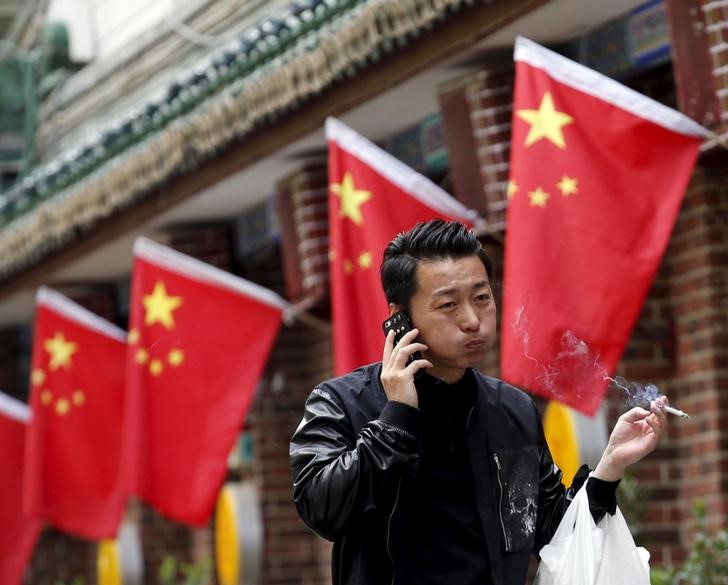(Bloomberg) -- China’s much-criticized trade surpluses are declining in a shift that’ll see less of its excess savings recycled into global capital markets.
For emerging markets already struggling to cope with rising U.S. interest rates, that prospect poses an additional set of dangers. A prolonged slide in China’s purchasing firepower would put upward pressure on global yields after a decade of binge-borrowing left the world’s emerging markets with a hangover.
With the Federal Reserve shrinking its balance sheet and raising interest rates, benchmark 10-year Treasury yields climbed to the highest since 2011 this month, putting strains on nations that borrowed big in the greenback. Turkey’s central bank has been forced into emergency action to shore up its currency, while Argentina has sought external help. While yields retreated in the past week, that may prove a blip as demand and supply dynamics shift.
"China might still have a mighty piggy bank, but its savings buffer is diminishing," said Frederic Neumann, co-head of Asian economics research at HSBC Holdings Plc (LON:HSBA) in Hong Kong. "Few have noticed or pondered the implications for global interest rates. The risk must be that when the world’s largest saver is turning off the tap, the cost of capital will begin to rise everywhere."
China’s surplus in its current account -- the broadest measure of trade and investment -- has shrunk to less than 2 percent of the size of its economy, from more than 9 percent a decade ago, International Monetary Fund data show. There was even a rare deficit in the first quarter. By 2023, the IMF sees it totaling only $132 billion -- in current terms, barely enough to take up one month’s worth of U.S. Treasury intermediate-term bond sales.
The current account matters for investors because surplus funds are often recycled into bonds and other assets via the capital account. If the current account surplus shrinks, there’s less to be pumped back into global markets.
Analysts including Goldman Sachs Group Inc (NYSE:GS). and ex-U.S. Treasury official Brad Setser -- calculate that China’s official current-account figures understate the true surplus. That said, Goldman projects just a 0.2 percent of GDP positive balance by 2021.
That’s the result of China’s focus on stoking domestic spending and reducing export reliance, as well as a deepening deficit in services, especially thanks to the annual outpouring of scores of millions of Chinese tourists. Xi’s government also is championing imports, in a rebuff to President Donald Trump’s accusations that China doesn’t play fair on trade.
The implication is that China will be following a different path than Japan, which saw its accumulated surpluses make it the world’s largest net creditor, and is projected to continue amassing current-account excesses for years to come. China last year slipped behind Germany in the creditor ranks, Japanese Ministry of Finance data showed last week.
Cross-border trade and investment flows are difficult to project, given the multiple of variables that go into them. But net-net, diminished Chinese surpluses suggest a fresh potential worry for global markets coming to grips with the epic reversal of developed nation central banks’ quantitative easing.
Another dynamic is at play when it comes to China’s appetite for overseas bonds. The country’s "disproportionate effect on global fixed-income markets" has stemmed in large part from the recycling of funds invested into China, says Guillermo Tolosa, an economic adviser to Oxford Economics Ltd. who analyzes global capital flows. Receiving dollars for fixed investments -- such as for joint ventures or production facilities -- China historically has reinvested those funds in Treasuries and other fixed-income securities, Tolosa said.
While real-time data are lacking, inflows of direct investment into China are likely diminishing, in part thanks to concerns about trade tensions, Tolosa said. That leaves the U.S. Treasury market with a "double whammy," with diminished Chinese demand at the same time as the Treasury is expanding its auctions to finance the American deficit.
The bright side is that China’s shift is likely to be even more gradual than the Fed’s "gradual" tightening that’s contributed to fears of crisis in some emerging markets.
"China will continue to be a source of savings for some years to come as it only slowly transforms into a more consumption-based economy," said Meg Lundsager, a fellow at the Wilson Center in Washington who served as the U.S. representative at the International Monetary Fund. "The transition to a stronger social safety net that would reduce the need for high household savings and enable more consumption will be slow."
Yet even if China continues to recycle funds back into the global financial system, their nature may be changing. Rather than the official purchases of U.S. Treasuries that China implemented in part to stem appreciation of its currency -- and that in turn helped to hold down borrowing costs in dollars -- direct investments such as corporate acquisitions or port construction could be more likely.
"China’s capital outflows are increasingly switching to higher-yield investments, including direct investment flows into both advanced and developing economies," said Eswar Prasad, a trade policy professor at Cornell University and former head of the IMF’s China unit. "China’s strong demand for U.S. Treasuries is a thing of the past."
